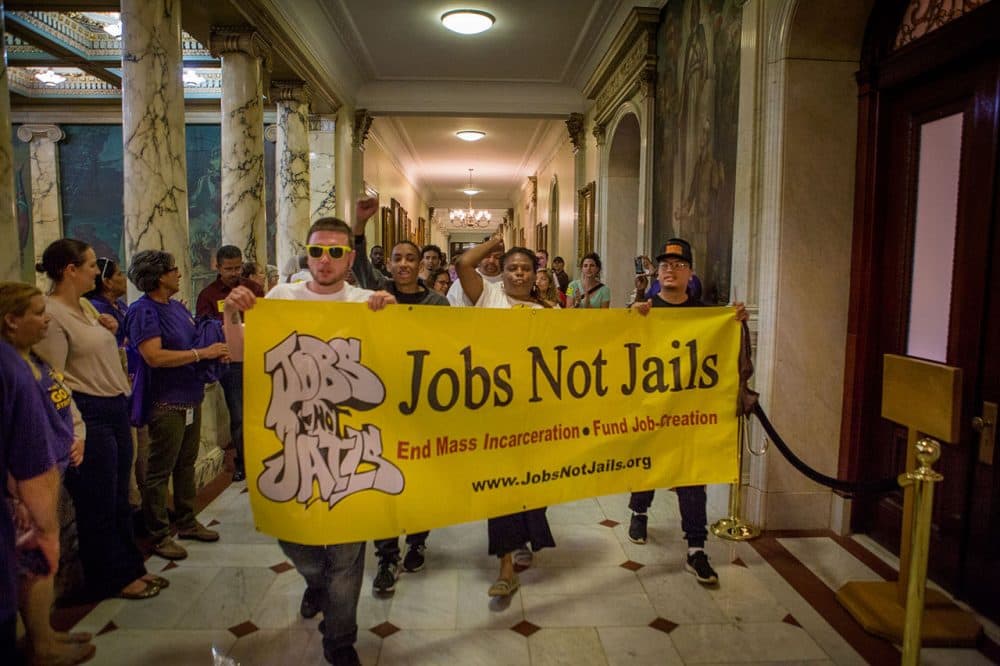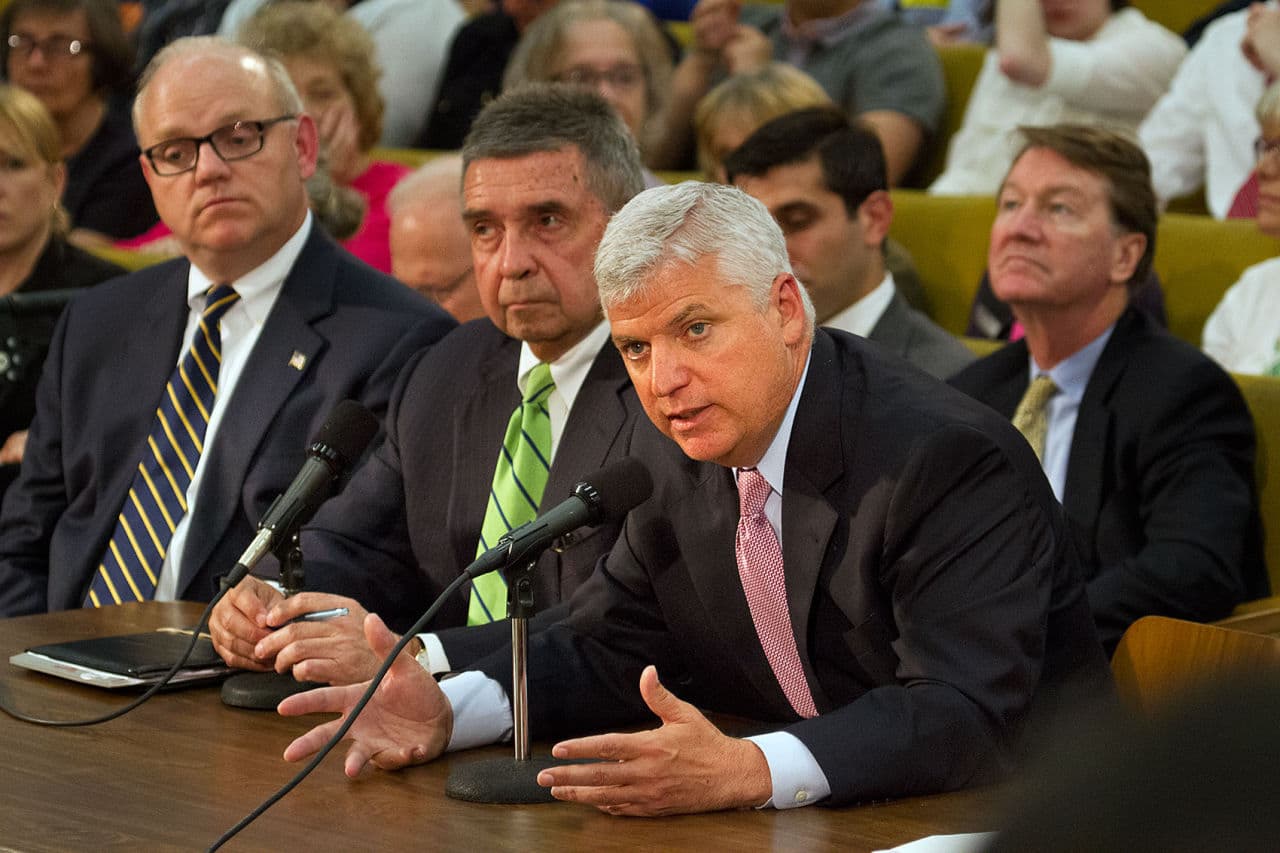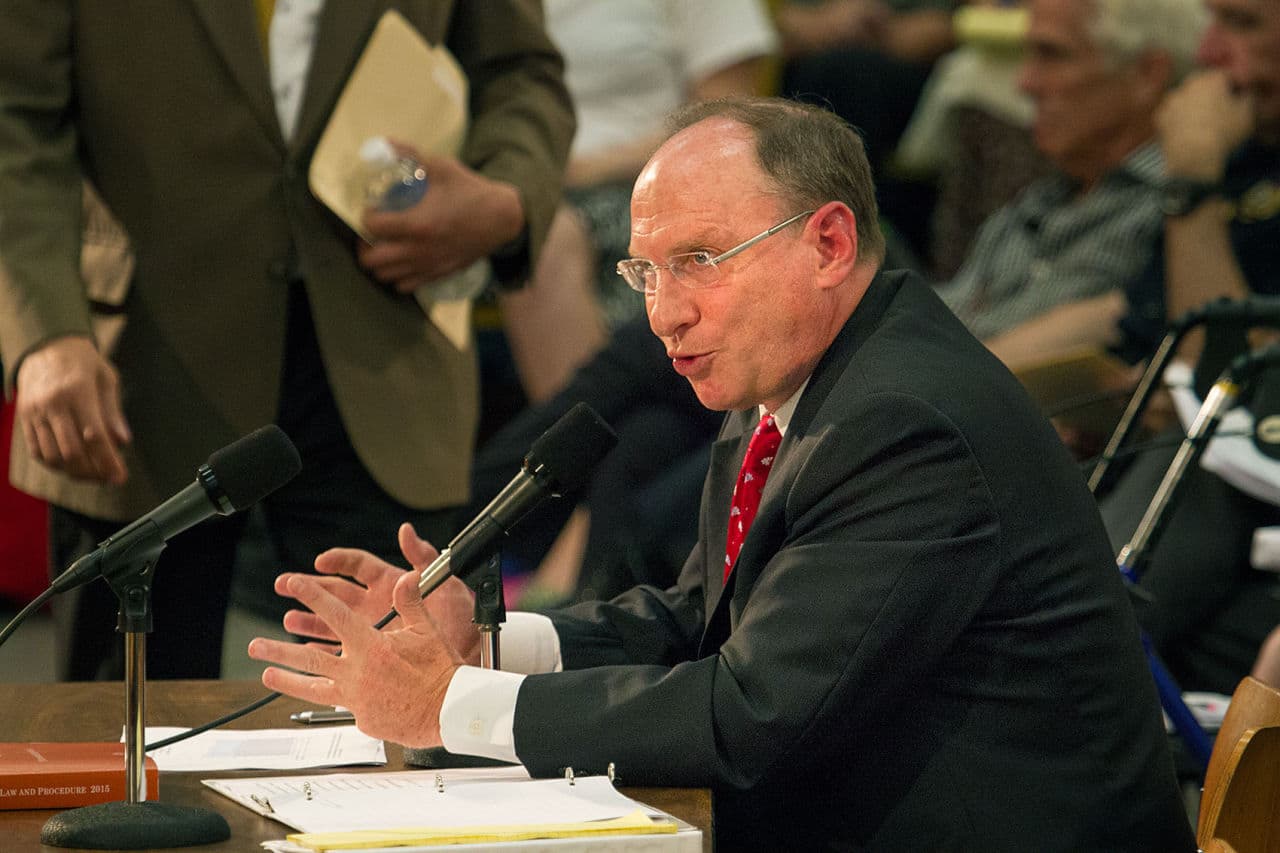Advertisement
4 Things To Know About The Mass. Debate On Mandatory Minimum Sentences

Lawmakers on Beacon Hill took up the issue of mandatory minimum prison sentences for drug offenses Tuesday with a packed public hearing on the long-debated issue.
Critics of mandatory sentences say they crowd prisons with people who really need treatment, not incarceration. Proponents say the mandatory sentences act as a deterrent for crime.
The subject of Tuesday's hearing was an overhaul proposed by Sen. Sonia Chang-Diaz, a Jamaica Plain Democrat, and Rep. Mary Keefe, a Worcester Democrat. Here's a primer on their legislation, and the issue:
What is this bill on mandatory minimum sentences about?
The central proposal in the lawmakers' bill is a repeal of mandatory minimum drug sentences in Massachusetts, which they say would reduce the costs — financial and social — of long prison terms and give discretion back to judges in determining sentences for non-violent drug charges. This proposal has led to debate between some judges and prosecutors (see below for more on that).
The bill includes additional criminal justice reforms called for by other lawmakers. It calls for certain low-level felonies — such as petty theft, shoplifting or low-level drug charges — to be reduced to misdemeanors.
Another part of the bill calls for the elimination of a law that requires the Registry of Motor Vehicles to suspend licenses, for up to five years, of people convicted of drug crimes, and to charge at least $500 to reinstate them — even when charges aren’t related to operating a vehicle.
The bill also calls for judges to have discretion on whether terminally ill or permanently incapacitated inmates can be transferred out of prison for treatment.
The measure also seeks to reduce recidivism with a "justice reinvestment" approach that would establish a trust fund with money saved from the proposed reforms. The fund would be used for job training programs for victims of violence, veterans, youth and others with significant barriers to employment. The fund would also be used to help at-risk youth stay in school through dropout prevention and recovery programs.
Hasn’t the issue of mandatory minimum sentences come up before?

Yes, it’s been an issue in Massachusetts and nationwide as other states have also looked to find alternative solutions to incarceration and address overcrowded prisons and sentencing disparities, among other issues.
In Massachusetts, there has been a push to overhaul sentencing laws for more than a decade. Mandatory minimum sentences were up for debate on Beacon Hill a few years ago. The issue then came to a head in 2012 when the Legislature passed a bill with a “three strikes” provision. The measure, which then-Gov. Deval Patrick signed into law, cracked down on repeat violent offenders as it eliminated the possibility of parole after a conviction of a third violent crime — or “three strikes.” The law also included reductions in mandatory minimum sentences for some non-violent drug offenders, which some saw as a step toward eliminating “one size fits all” drug policies that lock up non-violent offenders.
This latest attempt to overhaul Massachusetts' sentencing laws follows similar efforts across the U.S. — in both liberal and conservative states.
In November 2012, Californians voted to reform the state’s three strikes law by eliminating mandatory minimum sentences for non-violent crimes.
Between 2009 and 2013, 40 states took action to ease drug laws, according to the Pew Research Center.
State-level actions have included lowering penalties for possession and use of illegal drugs, shortening mandatory minimums or curbing their applicability, removing automatic sentence enhancements, and establishing or extending the jurisdiction of drug courts and other alternatives to the regular criminal justice system.
In that same time period, 10 states, including South Carolina and Rhode Island, eliminated mandatory sentences for some drug offenses, according to the National Conference of State Legislatures.
Other states such as Louisiana and Texas have also moved toward steering drug offenders into treatment programs, work release or other alternatives to incarceration.
The federal government has also weighed in on mandatory minimums. The Obama administration has endorsed reducing sentences for drug offenders. In August 2013, Attorney General Eric Holder announced he was changing Justice Department policy so non-violent, low-level drug offenders wouldn’t face charges with mandatory minimum sentences.
“We need to ensure that incarceration is used to punish, deter and rehabilitate — not merely to convict, warehouse and forget,” Holder said in his 2013 remarks at the American Bar Association in San Francisco.
What are the arguments in support of mandatory minimum sentences here in Massachusetts?

Many prosecutors support mandatory minimum sentences and say they have contributed to the drop in crime nationwide over the past two decades. Suffolk County District Attorney Dan Conley, who testified at the hearing Tuesday, has been vocal on the issue, calling mandatory minimum sentences a “substantial, contributing cause” of the drop in crime and an important tool for dealing with drug-related violence.
“The individuals who are subject to minimum mandatory sentences are drug traffickers,” Conley told Radio Boston in April. “There are no drug addicts in prison for being drug addicts. If they’re there, they’re there because they committed some other felony."
He made similar points in a March op-ed in Massachusetts Lawyer’s Weekly: “Only a fraction of our cases — about 4 percent — end with incarceration, and those who receive it are overwhelmingly violent offenders with long records. Minimum mandatories apply only to drug traffickers, not drug addicts, and they represent only a tiny subset of incarcerated individuals.”
The public wouldn’t benefit from repealing mandatory minimum sentences for drug crimes — criminals would, Conley said.
These defendants, and others like them, occupy a space at the deadly intersection of illicit drugs and violent crime. Since mandatory minimum laws were first adopted in the early ’90s, police and prosecutors have staked out this same ground, steering low-level, non-violent offenders away from jail and leveraging tougher sentences against the most dangerous offenders: those carrying and using illegal guns, murderers and, yes, drug traffickers whose greed drives violence and addiction.
He's also said prosecutors are discerning about crime in the community and are in a better position than judges to deal with drug crimes.
"With respect to the court and the judges, we simply know more about what is driving the violence in our communities than they do,” Conley told Radio Boston.
What are the arguments against mandatory minimum sentences?

Just as Conley has been a vocal proponent of mandatory sentences, the state’s highest judge, Ralph Gants, who also testified at Tuesday's hearing, has been a vocal opponent. The chief justice of the Supreme Judicial Court has said mandatory sentences are a one-size-fits-all approach that treats a drug courier the same as a drug kingpin. He’s also said mandatory sentences disproportionately affect minorities, create high costs because of long incarcerations, and essentially give prosecutors the power to determine prison terms.
Gants spoke about the issue at length in his first State of the Judiciary speech in October.
"The end of minimum mandatory sentencing for drug offenses would not mean the end of punishment and deterrence in drug sentencing," he said. "It would simply mean that sentences would not be higher than a judge thought appropriate in accordance with the best practices that we will incorporate into an individualized, evidence-based sentencing model."
And in more direct language, Gants challenged the hard-on-crime tactics of the '80s and '90s during the beginnings of the war on drugs.
"To those who favor the status quo in the so-called war on drugs, I ask: How well is the status quo working?" he said, pointing to the state's current opioid crisis.
Gants again spoke about the issue in March during a keynote address at the Mass. Criminal Justice Reform Coalition Summit, where he argued that prosecutors just didn't want to relinquish power to judges. He said a judge should determine what incarceration is necessary for the crime.
"Just as surgery should be spared where physical therapy would suffice, incarceration should be spared where probationary conditions will suffice," Gants said.
While the move to eliminate mandatory minimum sentences has received pushback from many prosecutors, the state’s attorney general supports the measure.
"History shows we cannot incarcerate our way out of this public health crisis, and we need smart reforms that will allow us to focus on treatment for those we are most able to help," Healey wrote in a letter urging lawmakers to eliminate mandatory minimum sentences.
Here's what Healey told WBUR’s Morning Edition on the issue:
